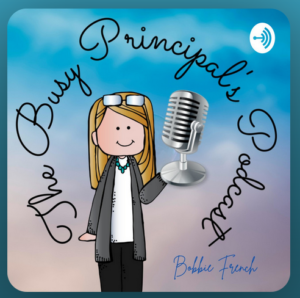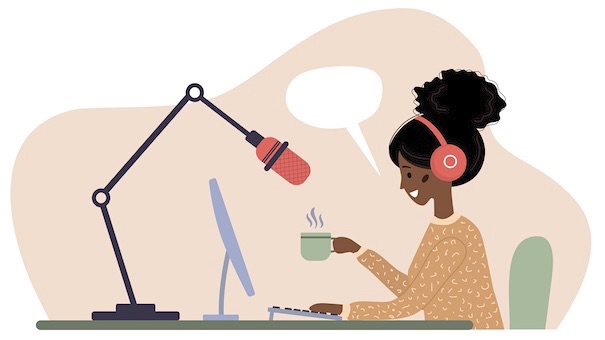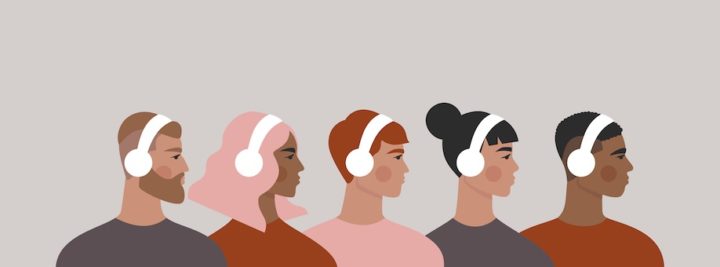Learn While You Listen with Education Podcasts
 The “Reading Through The 21st Century” series was inspired by my near-insatiable desire to read professional books and my reflections on how I can connect the ideas from those books to teaching and learning in the 21st century.
The “Reading Through The 21st Century” series was inspired by my near-insatiable desire to read professional books and my reflections on how I can connect the ideas from those books to teaching and learning in the 21st century.
I have a stack of eight books next to me on my desk right now that make up my immediate “to-be’read” (TBR) pile at work. I have another dozen or so at home that are my TBR-over-the-summer books.
My goal here isn’t to review these books but to reflect on the innovative pedagogy they inspire. That being said, regular readers may wonder why this article’s title is “Learning Through Listening.” After all, reading is not a listening activity, right?
Once upon a time, I would have agreed with that sentiment. I am a lover of books. Physical, tangible, ink-paper-glue books. This attitude changed in 2012 when my school community took on a challenge to collectively read 1,000,000 minutes in a single school year.
One of the discussions in our planning meetings was about younger students who would listen to books read aloud as part of learning to read. We had to decide if that would count towards our goal. We decided it did, and I came to accept that “reading” could be so much more than simply looking at words on a page; reading could include audiobooks, ebooks, the captions or subtitles on a TV show or movie – even internet talk.
Reading on the road
A few years later, I found myself driving up and down the state of Illinois as I was interviewed for leadership positions in dozens of school districts. On my way to one interview, I decided to try out this thing people had been talking about for years: podcasts.
I started with a series called Educators Lead, hosted by Jay Willis. Then I learned about Dr. Justin Baeder’s Principal Center Radio podcast. Next on my list was Hacking Leadership with Tony Sinanis and Joe Sanfelippo. The list of shows I started listening to kept growing.

That got me thinking: What have I come to understand about teaching and learning in the 21st century by listening to podcasts – and is this different from reading books, journals, blogs, and articles?
The podcast experience
I’m going to tackle the second part of that question first. What is the difference between listening to audio content and reading written content? For me, the biggest difference is in annotation. When I am listening to podcasts, it is usually when I am either driving or walking my dog. Neither situation is one that lends itself to taking notes – even if I have been known to grab a fast food napkin and jot down a note without looking while driving!
Listening to audio content is, for me, similar to attending a single session at a professional conference instead of signing up for a multi-week seminar series: I am going to get good ideas, I may jot a few down, but I am not going to be digging deep.
In contrast, the books I read are often heavily annotated with color-coded sticky notes or with comments jotted down in the notebook I keep with me at all times. I can transcribe the text and post it online with the title of the book as the hashtag to share with others and engage in conversations about the concepts or idea.
(And yes, it is true that I can do that with podcasts, too, but it is much more difficult to transcribe and to share audio content than it is to copy what is already written in a book.) So the biggest difference, for me, is how I interact with the text.
Of course, the biggest benefit of audio content over written content is that I can consume it while I am out walking my dog or driving my car. It is hard to read a book while holding onto an excited dog on a leash and it is generally frowned upon to read while in traffic. Especially when we’re moving.
So audio content allows me to continue thinking and reflecting on important issues relevant to the work of teaching and learning in situations when reading just isn’t possible or safe.
Are podcasts worth our time?
What about the first part of this question? What do I get from listening to podcasts? As I mentioned earlier, podcasts are, for me, similar to attending a conference session. They give me quick ideas that get me thinking. Several podcasts I listen to will include guests who have written books, and I am inspired to purchase their books afterwards in order to get that deeper dive experience.
(At least three dozen of the books currently on my shelves were acquired as a direct result of listening to a podcast, either because the author did a giveaway that I won or because I went out and bought one of the author’s books later – and this doesn’t even include the two dozen or so podcast-inspired “want to buy” books on my Amazon wishlists!)
Podcasts also help me build my professional learning network (PLN). There are many amazing educators that I have “met” through a podcast episode who have become regular contacts when I am working through challenging situations. Of the 3,306 people I am following on Twitter, I would not be surprised to see that a significant number of them, possibly even a majority, have been found through either hearing them on a podcast episode or by several degrees of separation from podcast hosts or guests!
And while yes, it is true that I have also built up my PLN by connecting with authors whose books I’ve read, I can safely say that I have connected with far more authors through listening to their episodes and interviews than I have reading their books. After all, I have heard thousands of guests on podcasts. While I am certainly well-read, I have not read nearly as many professional books!
Get started with podcasts
If you are interested in getting started with podcasts, or expanding your listening, here are a few suggestions:
- Teach Better Podcast Network – a growing list of podcasts on topics covering the full range of teaching, learning, leading, and equity, including the Teach Better Talk! podcast hosted by Rae Hughart and Jeff Gargas.
- The Cult of Pedagogy podcast – Teaching strategies, classroom management, education reform, educational technology — if it has something to do with teaching, Jennifer Gonzalez and her frequent guests are talking about it!
- The Dave Burgess Consulting (DBC) Author Podcast Playlist – Podcasts from the many different authors of DBC, Inc, including leadership coaches Sarah Johnson and George Couros – and Mr. Teach Like a PIRATE himself, who talks education, lifestyles, entrepreneurship, fitness, and more.
- Leading Equity – Dr. Sheldon Eakins interviews hundreds of guests about all things related to equity in education.
- Learning Through Leading – Matt Jacobson and Dr. Nick Sutton discuss teaching and leading through an educational technology lens.
- Punk Rock Classrooms – Josh R. Buckley and Michael R. Earnshaw met at a conference and discovered a shared loved for punk rock music, and this led to a collaboration on how the DIY spirt of the punk scene can be applied to education.
There are so many other podcasts out there. Whatever your interest, I guarantee there is a podcast out there! And if there isn’t, that just means you need to start your own. If you do, let me know so that I can subscribe!
P.S. If you have an education podcast I haven’t highlighted here, feel free to mention it in the comments.




































Larry Ferlazzo’s Classroom Q&A podcast at BAM! Radio features quick conversations with educators who have written on topics of current interest at Larry’s EdWeek column. We love the scope and the breadth of issues covered. https://larryferlazzo.edublogs.org/category/podcast/